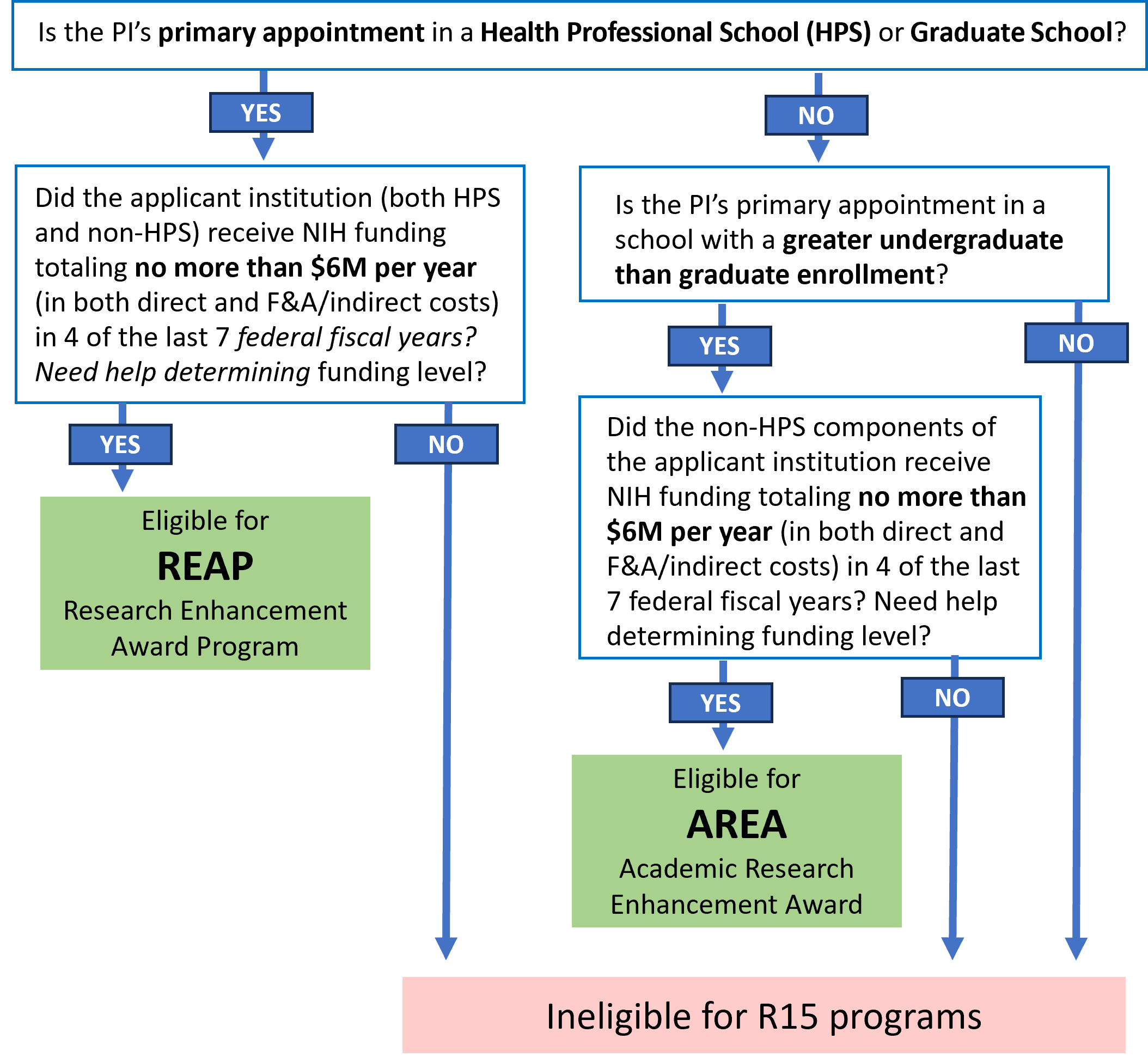Supports small-scale research projects at educational organizations that provide baccalaureate or advanced degrees for a significant number of the Nation’s research scientists but that have not been major recipients of NIH support.
The goals of the R15 are to:
- support meritorious research.
- expose students to research.
- strengthen the research environment of the institution.
Awards provide limited direct costs, plus applicable F&A costs, for periods not to exceed 36 months. This activity code uses multi-year funding authority.
The R15 Program
There are two programs under the R15:
- Academic Research Enhancement Award (AREA) for Undergraduate-Focused Institutions
- Research Enhancement Award Program (REAP) for Health Professional Schools and Graduate Schools
The R15 Program: What You Need to Know Webinar
R15 Eligibility Decision Tree
R15 Eligibility Decision Tree (Accessible PDF - 168 KB)
Organization Eligibility
To assist in determining eligibility, organizations are encouraged to use the NIH RePORT website and check Need Help Determining Organization Funding Levels for R15 Eligibility?
Academic Research Enhancement Award (AREA) for Undergraduate-Focused Institutions
- For the AREA R15 program:
- An academic component is any school/college that is not a Health Professional School or College.
- A qualifying academic component (i.e., school/college) within an organization (e.g. School of Arts and Sciences) has greater undergraduate student enrollment than graduate student enrollment.
- All types of Health Professional Schools and Colleges are not eligible to apply,
- The application must be submitted by the eligible undergraduate-focused organization with a unique entity identifier (SAM-issued UEI) and a unique NIH eRA Institutional Profile File (IPF) number.
- For organizations with multiple campuses, eligibility can be considered for each individual campus (e.g. main, satellite, etc.) only if separate UEIs and NIH IPF numbers are established for each campus. For organizations that use one UEI or NIH IPF number for all campuses, eligibility is determined for all campuses (e.g. main, satellite, etc.) combined.
- The applicant organization must be an accredited public or non-profit private school that grants baccalaureate degrees in biomedical sciences.
- At the time of application submission, all the non-health professional components of the organization together have not received support from the NIH totaling more than $6 million per year (in both direct and F&A/indirect costs) in 4 of the last 7 federal fiscal years. Note that all activity codes are included in this calculation except the following: C06, S10, and all activity codes starting with a G.
- A signed letter is required from the Provost or similar official with organization-wide responsibility verifying the eligibility of the applicant organization at the time of application submission.
Research Enhancement Award Program (REAP) for Health Professional Schools and Graduate Schools
- The application must be submitted by the eligible health professional or graduate school with a unique entity identifier (SAM-issued UEI) and a unique NIH eRA Institutional Profile File (IPF) number.
- For organizations with multiple campuses, eligibility can be considered for each individual campus (e.g. main, satellite, etc.) only if separate UEIs and NIH IPF numbers are established for each campus. For organizations that use one UEI or NIH IPF number for all campuses, eligibility is determined for all campuses (e.g. main, satellite, etc.) combined.
- The applicant organization must be an accredited public or non-profit private school that grants baccalaureate or advanced degrees in health professions or advanced degrees in biomedical and behavioral sciences.
- At the time of application submission, all components of the applicant organization combined may not have received support from the NIH totaling more than $6 million per year (in both direct and F&A/indirect costs) in 4 of the last 7 federal fiscal years. Note that all activity codes are included in this calculation except the following: C06, S10, and all activity codes starting with a G.
- A signed letter is required from the Provost or similar official with organization-wide responsibility verifying the eligibility of the applicant organization at the time of application submission.
Project Director/Principal Investigator (PD/PI) Eligibility
- The PD/PI must have a primary appointment at the R15-eligible organization.
Additionally, for:- AREA: Each PD(s)/PI(s) must have a primary appointment at a non-health professional school or college within the applicant organization. If proposing multiple PD(s)/PI(s), each PD/PI must be at an AREA-eligible organization.
- REAP: Each PD(s)/PI(s) must have a primary appointment at a health professional or graduate school or college within the applicant organization, If proposing multiple PD(s)/PI(s), each PD/PI must be at a REAP-eligible organization.
- The PI may not be the PI of an active NIH research grant at the time of a R15 award, though he or she may be one of the Key Personnel for an active NIH grant held by another PD/PI.
- Instrumentation awards (S10), conference grants (R13), and institutional training grants (T32) are examples of grants that are not considered research grants.
- The PI may not be awarded more than one R15 grant at a time.
- Eligibility applies only to the PI and Multiple PIs, not to collaborators, consultants, or subawardees.
Carefully read the Eligibility section of the funding opportunity for opportunity-specific PD/PI eligibility requirements.
Award Information
- Funding Instrument: Grant
- Multi-year Funded: Yes
- Project Period: Limited to 3 years
- NIH's Modular Budget Policy applies:
- Applicants submitting an application with direct costs of $250,000 or less (total for all years, excluding consortium Facilities and Administrative [F&A] costs) must use the Modular Budget.
- Applicants submitting an application with direct costs of $250,001-$375,000 (total for all years, excluding consortium Facilities and Administrative [F&A] costs) must use the Research and Related (R&R) Budget form.
- Awards can be renewed by competing for an additional project period.
Application Characteristics
- The application should propose a research team, including undergraduate and/or graduate students, that is appropriate to accomplish the specific aims and to make an important scientific contribution.
- A signed letter is required from the Provost or similar official with organization-wide responsibility verifying the eligibility of the applicant organization at the time of application submission.
- Sample application attachments
After identifying a funding opportunity, follow guidance in the How to Apply – Application Guide, including any Research instruction call-outs except where instructed to do otherwise in the funding opportunity or related notices.
Due Dates
Each funding opportunity provides opportunity-specific due dates or identifies standard due dates based on activity code.
Standard Due Dates
| Application Due Dates | Review and Award Cycles | ||||
| New | Renewal, Resubmission, Revision (As Allowed) | AIDS - New, Renewal, Resubmission, Revision (As Allowed) | Scientific Merit Review | Advisory Council Review | Earliest Start Date |
| February 25 | February 25 | May 7 | June or July | August or October | September or December |
| June 25 | June 25 | September 7 | October or November | January | April |
| October 25 | October 25 | January 7 | February or March | May | July |
Award Data
The Research Portfolio Online Reporting Tools (RePORT) website provides information about research grants including the number of funded new and competing R01s, average award dollars and characteristics of research project grants.
Active Funding Opportunities
NIH Guide for Grants and Contracts search results for active R15 opportunities.






